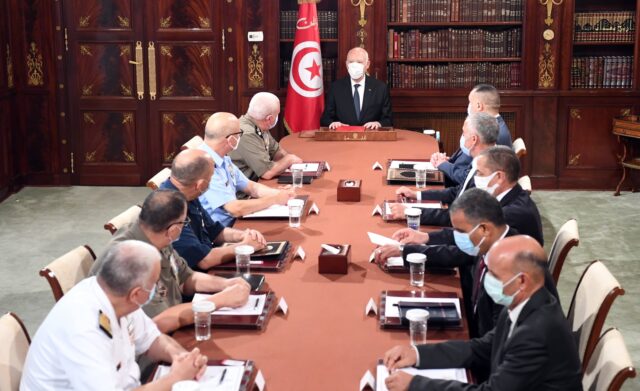While the western countries have been promoting the democratic values and building alliances to promote the same, the last year has seen many set backs to the same. The recent crisis in Tunisia adds to the list of countries that have shown a disregard for democratic values.
Tunisian President Kais Saied on Sunday orchestrated a well planned strategy similar to a coup and suspended the parliament with support from the army. Tunisia is under severe economic strain and that led to disagreements between President Saied and the Prime Minister Hichem Mechichi. President Saied decided to invoke emergency in the country and suspended the parliament for 30 days. He said that the country’s failing economy, the violent demonstrations against the government and the pandemic together forced him to take things in his hands.
Tunisia adopted democracy in 2014 after the Arab Spring shook the entire Middle East by a swirl. Brookings reported in 2021 that the Tunisian democracy was work in progress still. The democratic spirit of Tunisia has often been applauded especially due to the manner in which leaders from opposite parties i.e. Beji Caid Essebesi and Rached Ghannouchi came together to form a coalition for a better future for the country. However, Brookings points out that it is this compromise that led to giving up of basics in trying to reach a consensus which that resulted in rise of issues and misunderstandings. In January 2021, parliament poses a threat to the democratic transition in the country.
Things Off the Track
Thus, the recent events have not come as a shock to many though the extent might be unpredictable. The major problem is that the scenarios liked these are forcing people to question the basic tenets of democracy. More so because western states have high stakes in Tunisia especially through European Union. In fact in June 2021, President Saied met with the President of European Council Ursula von Der Leyen to discuss ways of strengthening the ties between the two countries based on shared values and interests. The talks focussed on education, culture as well as economic relations. But due to the recent upheaval, the European Union seems concerned. The Reuters reported that the European Parliament President David Sassoli said that the current situation demanded that all parties in Tunisia came back to the negotiating table and discussed means to fight the pandemic. He urged that all political actions should be done to restore order, return to dialogue and promote interests of people.
The African Union too requested the Tunisians to respect the Constitution and refrain from any acts of violence. France called for respecting the Rule of Law. German spokesperson was reported hoping for the restoration of the country to a state of constitutional order.
The American Secretary of State Anthony Blinken said that Tunisian President Saied should adhere to the principles of democracy and human rights. He expressed his support to democracy in Tunisia over a phone call with President Saied.
The United Nations too requested all the concerned parties to practise restraint and avoid any form of violence.
Prospective Path Ahead
Despite the international involvement in the Tunisian state of affairs, countries in general have refrained from an absolutely critical tone. There has been an undermining of the so called coup in Tunisia. The two reasons that justify this stand are : One, this is yet again a collapse of a democratic machinery. At a time when many countries are advocating adopting democratic values, the Tunisian behaviour raises questions about the model itself. Secondly, Tunisia has heavy stakes in a lot of countries in Europa and vice-versa. Such a scenario in the country has put several countries in a spot. There is a balance of words evident in the statements issued. There is still confusion if this whole scenario was a coup at all. Thus, most of the countries have just expressed their concern for the breakdown of the democratic set up and hope that all the concerned parties understand the value of dialogue.
The Tunisian crisis is definitely a setback to the advocates of democracy. Tunisia has been struggling economically and the youth have often expressed their dissatisfaction. When President Saied suspended the parliament, there were many young people who celebrated the decision by coming on streets and expressing their happiness. There have been reports of phone calls between heads of many countries speaking to Tunisian President Saied and requesting him to let peace prevail. It can not be denied that the sudden change in the political leadership does raise substantial doubt about the functioning of the system in total.









